|
|
|
Sort Order |
|
|
|
Items / Page
|
|
|
|
|
|
|
| Srl | Item |
| 1 |
ID:
145942
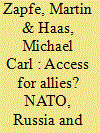

|
|
|
|
|
| Summary/Abstract |
One of the most important debates currently underway within NATO focuses on the extent to which the Alliance should have a forward presence of Allied combat forces in the exposed Baltic States. Limited-presence arrangements are likely to fall short of their deterrent purpose if they fail to account for Russia’s growing ability to threaten NATO’s operational access to the Baltics. Martin Zapfe and Michael Carl Haas argue that any NATO strategy of assured access would face significant hurdles and come at a price. Although it could considerably strengthen conventional deterrence, such a strategy would be liable to exacerbate the regional security dilemma and could lead to a lasting regionalisation of the Alliance.
|
|
|
|
|
|
|
|
|
|
|
|
|
|
|
|
| 2 |
ID:
009110
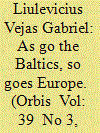

|
|
|
|
|
| Publication |
Summer 1995.
|
| Description |
387-402
|
|
|
|
|
|
|
|
|
|
|
|
|
|
|
|
| 3 |
ID:
010962
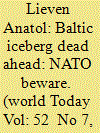

|
|
|
|
|
| Publication |
July 1996.
|
| Description |
175-179
|
|
|
|
|
|
|
|
|
|
|
|
|
|
|
|
| 4 |
ID:
088155
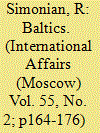

|
|
|
|
|
| Publication |
2009.
|
| Summary/Abstract |
THE OCCUPATION DOCTRINE adopted by the Baltics serves as a legal basis for resolving a whole array of many practical and ideological issues. Discrimination against hundred of thousands of those who permanently live in the region is one of such issues. In Estonia where certain posts are banned for them they are also kept away from the polls in parliamentary elections; Latvia has gone even further - certain population groups cannot elect local administrations. The financial claims to Russia are also part of the occupation doctrine.
The very much discussed and deliberately fanned occupation issue contradicts common sense. Can we describe as occupation the regime under which the "occupied" enjoyed the same rights as the "occupants"; there was no "occupation regime" in the Baltic republics and no military administrators (Germany, for example, appointed its Gauleiters in the occupied territories); there were no other attributes of an occupation regime. In fact, it was the legally elected parliaments of Latvia, Lithuania and Estonia that in 1940 passed a decision to join the USSR. The fact that the 1991 decisions on independence were passed by their Supreme Soviets, bodies of the "occupation regime," makes the discussion of occupation a political oddity.
|
|
|
|
|
|
|
|
|
|
|
|
|
|
|
|
| 5 |
ID:
012027
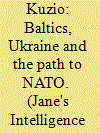

|
|
|
|
|
| Publication |
July 1997.
|
| Description |
300-303
|
|
|
|
|
|
|
|
|
|
|
|
|
|
|
|
| 6 |
ID:
138566


|
|
|
|
|
| Summary/Abstract |
Estonians were in full Christmas mood in late December, buying presents and mingling at holiday markets to the background music of children practicing songs greeting the arrival of Baby Jesus. But at 5:05 p.m. on December 9, 2014, another unexpected guest appeared: a Russian IL-20 reconnaissance plane, which entered Estonian airspace without permission, without a flight plan, and with its transponder switched off.
|
|
|
|
|
|
|
|
|
|
|
|
|
|
|
|
| 7 |
ID:
164375
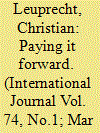

|
|
|
|
|
| Summary/Abstract |
Although the dissolution of the Soviet Union may have altered the founding Cold War rationale for NATO, the fundamental principle of the transatlantic alliance has prevailed for 70 years: the collective defence of shared interests. In the face of Russian aggression, and uncertainty about US continued commitment to the alliance, reinforcing NATO has emerged as Canada's top expeditionary defence priority. Indeed, just before the NATO summit in July 2018, Prime Minister Justin Trudeau renewed Canada's commitment to the enhanced Forward Presence (eFP) as the Framework Nation for Latvia for four years, and scaled up Canada's contribution to the allied battlegroup. This decision is as much a reflection of the eFP's immediate collective defence requirements in Latvia as it is of the extent to which the existential fate of Canada's most important defence asset hangs in the balance: the alliance, Canada's role in it, and the future of Canadian defence policy.
|
|
|
|
|
|
|
|
|
|
|
|
|
|
|
|
| 8 |
ID:
177995
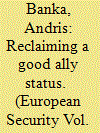

|
|
|
|
|
| Summary/Abstract |
What are the coping strategies of small states at a time when their great power ally questions its security guarantees? Faced with such a scenario, one strand of the literature proposes that small states will seek to establish a reputation of a “good ally” in the eyes of their security patron, thus reducing the likelihood of abandonment. Others, however, maintain that in times of heightened geopolitical uncertainty, small states will attempt to “hedge their bets” by reducing their reliance upon a capricious great power and pursue strategic realignment. The article tests these theoretical assumptions against NATO’s easternmost members: Estonia, Latvia, and Lithuania and their navigation of the “America First” world. The analysis lends evidence that the Baltics have not sought a strategic reorientation away from Washington. Instead, to guard against the possibility of their patron’s defection, they have strived to gain a loyal and trustworthy partner’s reputation by increasing their defence spending and joining the US on a foreign battlefield. The study concludes that these efforts have been primarily geared towards an audience of one: a NATO-sceptic US President.
|
|
|
|
|
|
|
|
|
|
|
|
|
|
|
|
| 9 |
ID:
141405
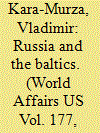

|
|
|
|
|
| Summary/Abstract |
MOSCOW — This may be hard to imagine, but there was a time when the national independence movements in the Baltic states had no greater ally than Russia, and its leader. As Soviet tanks rolled into Vilnius to crush Lithuania’s independence aspirations in January 1991, Boris Yeltsin—speaker of Parliament and head of state of the Russian Federation, then still a constituent part of the USSR—made a strong public stand against the Kremlin’s aggression and backed self-determination for the Baltic republics. In what Western diplomats—and many of his own supporters—considered a “crazy” move, Yeltsin then flew to the Estonian capital of Tallinn to sign a joint statement of mutual support with the leaders of the three Baltic states, as well as separate cooperation treaties with Estonia and Latvia, recognizing their “inalienable right to national independence” in an act that, in the opinion of many observers, prevented further bloodshed. While in Estonia, Yeltsin met with Soviet troops stationed there and urged them to disobey any orders from their Kremlin commanders to crush peaceful demonstrators. On the advice of friends, who had (well-founded) fears that the KGB might try to shoot down his plane, Yeltsin returned to Russia in a private car.
|
|
|
|
|
|
|
|
|
|
|
|
|
|
|
|
| 10 |
ID:
131833
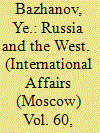

|
|
|
|
|
| Publication |
2014.
|
| Summary/Abstract |
IS RUSSIA A PARTNER of the West? This question has been repeatedly asked throughout centuries both in Russia and in the West. In the 13th century, German crusaders, with the Pope's blessing, invaded the Baltics and pushed further on to Russia, seeking political and spiritual domination. In Russia, this created a rift between those who wanted to draw closer to the West and those who saw it as a deadly threat to the unique East Slavic Orthodox civilization. The crusaders were pushed back, while Russia throughout three more centuries was learning, first unwillingly and later much more consciously, to associate itself with the Tatar-Mongol khans, the conquerors who came from the East.
|
|
|
|
|
|
|
|
|
|
|
|
|
|
|
|
| 11 |
ID:
146290
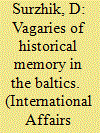

|
|
|
|
|
| Summary/Abstract |
IN HIS LATEST MONOGRAPH, "By Fire, Bayonet and Flattery,"* Vladimir Simindey investigated an important problem that has so far remained barely analyzed in Soviet/Russian historiography, viz. interpretations of history and impacts of World Wars One and Two on the Baltic republics and their development between the wars as presented by official analysts in the Baltic states. The author has pointed out that the works recently published with official support in the three Baltic states offer a nationalist interpretation readily accepted in the academic, educational and socio-political spheres.
|
|
|
|
|
|
|
|
|
|
|
|
|
|
|
|
|
|
|
|
|